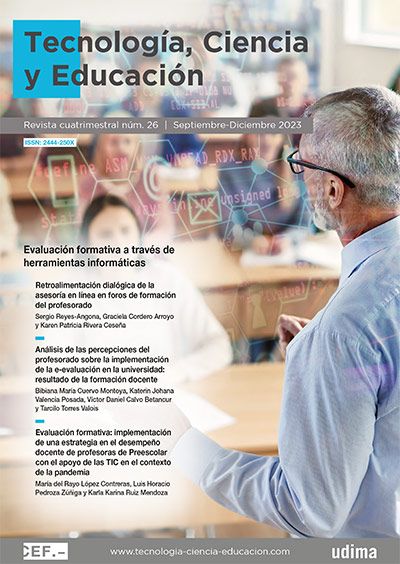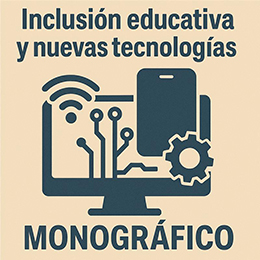Formative evaluation: implementation of a strategy in teaching performance of Preschool teachers with the support of ICT in the context of pandemic
DOI:
https://doi.org/10.51302/tce.2023.18727Keywords:
formative evaluation, teacher training, feedback, educational technology, Preschool Education, information and communication technologies (ICT), data visualizationAbstract
During the COVID-19 pandemic it was necessary to resort to emergency remote teaching and various technological tools in order to continue the preservice education of future teachers and to improve their practice through formative evaluation. The article assesses the results of implementing a formative evaluation strategy, based on the use of technological, computational and digital tools, in the performance of Preschool teachers (women). A quasi-experimental, multiple baseline design across five participants was used. The practice evidence was collected through a digital portfolio and a rubric (aligned to the Mexican Preschool Education program) was used to assesses the teaching performance. The results showed a modest improvement in performance, although it was consistent. Findings compared to other studies, the variation of performance, characteristics and principles of teacher formative evaluation, and the contribution of the use of information and communication technologies (ICT) are discussed. It is concluded that the formative evaluation strategy used with the support of ICT promoted an improvement in the performance of the teachers, given that the criteria of consistency and patterns of change to reflect the effect of the intervention were met.
Supporting Agencies
Este trabajo contó con el apoyo del Fondo de Investigación del Programa para el Desarrollo Profesional Docente para el Tipo Superior (PRODEP) dirigido a nuevos profesores de tiempo completo (México, 2019).
Downloads
References
Akalin, S. y Sucuoglu, B. (2015). Effects of classroom management intervention based on teacher training and performance feedback on outcomes of teacher-student dyads in inclusive classrooms. Educational Sciences: Theory & Practice, 15(3), 739-758. https://doi.org/10.12738/estp.2015.3.2543
Arámburo Contreras, M.ª F., Gandar Ibargüen, L. E., Medina Peña, R. V. y Tirado Barraza, K. A. (2020). El impacto de las herramientas informáticas en el aprendizaje durante la pandemia. Revista ReDTIS, 4(4). https://www.redtis.org/index.php/Redtis/article/view/69/62
Black, P. y Wiliam, D. (2009). Developing the theory of formative assessment. Educational Assessment, Evaluation and Accountability (Formerly: Journal of Personnel Evaluation in Education), 21(1), 5-31. https://doi.org/10.1007/s11092-008-9068-5
Black, P. y Wiliam, D. (2018). Classroom assessment and pedagogy. Assessment in Education: Principles, Policy & Practice, 25(6), 551-575. https://doi.org/10.1080/0969594X.2018.1441807
Brookhart, S. M. (2009). Editorial. Educational Measurement: Issues and Practice, 28(1), 1-2. https://doi.org/10.1111/j.1745-3992.2009.01131.x
Cañadas, L., Santos-Pastor, M.ª L. y Ruiz Bravo, P. (2021). Percepción del impacto de la evaluación formativa en las competencias profesionales durante la formación inicial del profesorado. Revista Electrónica de Investigación Educativa, 23, 1-13. https://doi.org/10.24320/redie.2021.23.e07.2982
Cizek, G. (2010). An introduction to formative assessment. History, characteristics, and challenges. En H. L. Andrade y G. J. Cizek (Eds.), Handbook of Formative Assessment (pp. 3-17). Routledge.
Cizek, G. J., Andrade, H. L. y Bennet, R. E. (2019). Formative assessment: history, definition, and progress. En H. L. Andrade, R. E. Bennet y G. J. Cizek (Eds.), Handbook of Formative Assessment in the Disciplines (pp. 3-19). Routledge.
Darling-Hammond, L., Hyler, M. E. y Gardner, M. (2017). Effective teacher professional development. Learning Policy Institute. https://learningpolicyinstitute.org/product/teacher-prof-dev
Diario Oficial de la Federación. (2018). Acuerdo número 14/07/18 por el que se establecen los planes y programas de estudio de las licenciaturas para la formación de maestros de Educación Básica que se indican. México. https://dof.gob.mx/nota_detalle.php?codigo=5533902&fecha=03/08/2018&print=true
Díaz-Barriga, Á. (2015). VII. Evaluación formativa y profesión docente. Conflicto de visiones. En G. Guevara, M. T. Meléndez, F. E. Ramón, H. Sánchez y F. Tirado (Coords.), La evaluación docente en México (p. 139-167). FCE/INEE.
Fuchs, K. (2022). The difference between emergency remote teaching and e-learning. Frontiers in Education, 7, 1-3. https://doi.org/10.3389/feduc.2022.921332
Gobierno de México. (s. f.). Consejo Nacional de Fomento Educativo. ¿Qué hacemos? https://www.gob.mx/conafe/que-hacemos
González Fernández, M.ª O. (2021). La capacitación docente para una educación remota de emergencia por la pandemia de la COVID-19. Tecnología, Ciencia y Educación, 19, 81-102. https://doi.org/10.51302/tce.2021.614
Hamodi Galán, C., López-Pastor, V. M. y López-Pastor, A. T. (2017). If I experience formative assessment whilst studying at university, will I put into practice later as a teacher? Formative and shared assessment in Initial Teacher Education (ITE). European Journal of Teacher Education, 40(2), 171-190.
Hattie, J. y Timperley, H. (2007). The power of feedback. Review of Educational Research, 77(1), 81-112. https://doi.org/10.3102/003465430298487
Hodges, C., Moore, S., Lockee, B., Trust, T. y Bond, A. (2020). The difference between emergency remote teaching and online learning. Educause Review, 27, 1-12. https://vtechworks.lib.vt.edu/bitstream/handle/10919/104648/facdev-article.pdf?sequence=1&isAllowed=y
INEE. (2018). Directrices para mejorar la formación inicial de los docentes de educación básica. Resumen ejecutivo.
Kazdin, A. (2011). Single-Case Research Designs. Methods for Clinical and Applied Settings. Oxford University Press.
Kazdin, A. E. (2019). Single-case experimental designs. Evaluating interventions in research and clinical practice. Behavior Research and Therapy, 117, 3-17. https://doi.org/10.1016/j.brat.2018.11.015
Kerlinger, F. y Lee, H. (2008). Investigación del comportamiento. McGraw-Hill.
Lavado Guzmán, M. I. y Herrera Alvarez, A. M.ª (2022). Evaluación formativa como desafío de la educación universitaria ante la virtualidad en tiempos de pandemia. Revista de Ciencias Sociales, 28(1). https://www.redalyc.org/journal/280/28069961002/28069961002.pdf
López López, M.ª L. (2017). Portafolio digital en la nube para docentes universitarios. Revista Publicando, 4(12), 806-816. https://revistapublicando.org/revista/index.php/crv/article/view/966
Martínez Rizo, F. (2012). La evaluación formativa. En F. Martínez-Rizo, La evaluación en el aula: promesas y desafíos de la evaluación formativa (pp. 83-146). Universidad Autónoma de Aguascalientes.
Martínez Rizo, F. (2016). La evaluación de docentes de educación básica. Una revisión de la experiencia internacional. INEE.
Miguel Román, J. A. (2020). La educación superior en tiempos de pandemia: una visión desde dentro del proceso formativo. Revista Latinoamericana de Estudios Educativos, 50(núm. especial), 13-40. https://doi.org/10.48102/rlee.2020.50.ESPECIAL.95
OCDE. (2018). Early Learning Matters. http://www.oecd.org/education/school/Early-Learning-Matters-Project-Brochure.pdf
Pedroza Zúñiga, L. H. y García-Poyato Falcón, J. (2022). La retroalimentación de la práctica docente, una revisión sistemática de la literatura. Profesorado. Revista de Currículum y Formación del Profesorado, 26(3), 569-593. https://doi.org/10.30827/profesorado.v26i3.16925
Pedroza Zúñiga, L. H. y Luna Serrano, E. (2017). Desarrollo y validación de un instrumento para evaluar la práctica docente en educación Preescolar. RIEE. Revista Iberoamericana de Evaluación Educativa, 10(1), 109-129. https://doi.org/10.15366/riee2017.10.1.006
Rama, C. (2021). La nueva educación híbrida. UDUAL.
Ravela, P., Picaroni, B. y Loureiro, G. (2017). ¿Cómo mejorar la evaluación en el aula? Reflexiones y propuestas de trabajo para docentes. Grupo Magro Editores/Secretaría de Educación Pública/Instituto Nacional para la Evaluación de la Educación.
Rogers, E. (1983). Difusion of Innovations. The Free Press.
Ruiz Cuéllar, G. (2021). Evaluación formativa del aprendizaje. Uno de los tantos desafíos que trajo la pandemia. Revista Mexicana de Investigación Educativa, 26(90). https://www.redalyc.org/articulo.oa?id=14068995001
Ruiz Mendoza, K. K., Castillo Villapudua, K., Miramontes Arteaga, M.ª A. y González García, A. Y. (2022). Educación remota de emergencia: aplicaciones y plataformas educativas utilizadas durante la pandemia. Alternancia, 4(7), 73-86.
Sadler Royce, D. (1998). Formative assessment: revisiting the territory. Assessment in Education: Principles, Policy & Practice, 5(1), 77-84. https://doi.org/10.1080/0969595980050104
Silva Ríos, C. E., Villaseñor Palma, K., Valdivia Vizarreta, P. y Guzmán Zárate, C. (2021). Recursos, usos de las TIC y fortalecimiento de las educadoras sociales durante la pandemia de la COVID-19 en zonas rurales de Puebla, México. Educació Social. Revista d'Intervenció Socioeducativa, 78, 107-127.
Scheeler, M., Congdon, M. y Stansbery, S. (2010). Providing immediate feedback to co-teachers through bugin-ear technology: an effective method of peer coaching in inclusion classrooms. Teacher Education and Special Education, 33(1), 83-96.
Scheeler, M., McKinnon, K. y Stout, J. (2012). Effects of immediate feedback delivered via webcam and bug-in-ear technology on preservice teacher performance. Teacher Education and Special Education, 35(1), 77-90.
Secretaría de Educación Pública. (2020). Boletín SEP n.º. 332. Expone SEP estrategia educativa de Aprende en Casa a representantes de Japón. Gobierno de México. https://www.gob.mx/sep/es/articulos/boletin-sep-no-332-expone-sep-estrategia-educativa-de-aprende-en-casa-a-representantes-de-japon?idiom=es
Shepard, L., Penuel, W. y Pellegrin, J. (2016). Using learning and motivation theories to coherently link formative assessment, grading practices, and large-scale assessment. Educational Measurement: Issues and Practice, 37(1), 21-34.
Tillema, H. (2010). Formative assessment in teacher education and teacher professional development. En P. L. Peterson, E. Baker y B. McGaw, International Encyclopedia of Education (3.ª ed.). Elsevier.
UNESCO. (2015). Investing in teachers is investing in learning: a prerequisite for the transformative power of education; background paper for the Oslo Summit on Education for Development. https://unesdoc.unesco.org/ark:/48223/pf0000233897?1=null&queryId=13ace2c3-f045-4078-94c4-33c8bffc7879
Wollenschläger, M., Hattie, J., Machts, N., Möller, J. y Harms, U. (2016). What makes rubrics effective in teacher-feedback? Transparency of learning goals is not enough. Contemporary Educational Psychology, 44-45, 1-11. https://doi.org/10.1016/j.cedpsych.2015.11.003
Downloads
Published
How to Cite
Issue
Section
License
Copyright (c) 2023 María del Rayo López Contreras, Luis Horacio Pedroza Zúñiga, Karla Karina Ruiz Mendoza

This work is licensed under a Creative Commons Attribution-NonCommercial-NoDerivatives 4.0 International License.


























